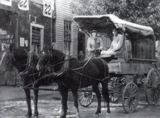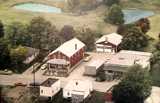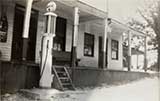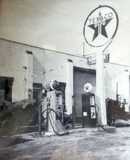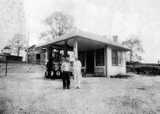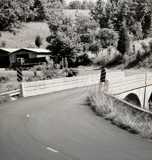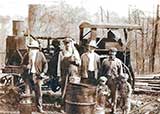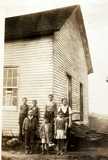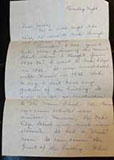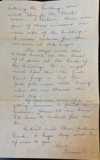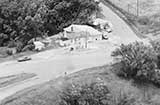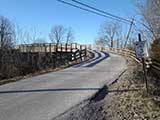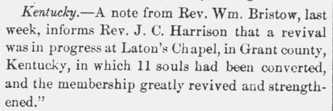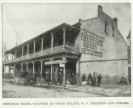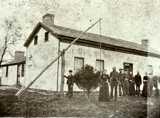
Harry Webb and his Huckster wagon in Williamstown, c. 1915
Think of hucksters as general stores, on wagons, that drove all around the county.
![]()
Jonesville Aerial View
From a Facebook post by Janie N Mike Prather
 |
|
Jonesville Methodist Church, c. 1910
| The Jonesville Deposit Bank merged with the Citizens Bank (Dry Ridge) on June 7, 1940. It was originally chartered on June 29, 1918. We have the incorporation papers (pdf), which contains a list of the original stockholders. |
 |
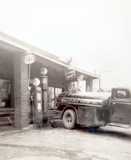 |
| Jonesville Grocery, left, and Garage, 1948 | |
| From a Facebook post by Kate Clemons | |
| “The new jail is complete and ready for occupancy.”From the Jonesville news in Williamstown Courier, September 28, 1899 | |
| “Jonesville. Our little village is comprised of one blacksmith shop, one store and a post office. There are, we are sorry to say, some complaints about the latter.” from Covington’s Daily Commonwealth, March 22, 1879 | |
| Two items about a destructive fire in 1894, in Jonesville, here. | We found a history of Jonesville (pdf). |
| “Jonesville – A large crowd of sportsmen congregated in Jonesville last Friday to witness the turning loose of a fox, which had been kept by G. T. Smith quite a while for that purpose [i.e. fox hunting]. They were disappointed, however, as Mr. Fox made good his escape before the dogs were turned loose.” From the Williamstown Courier, November 3, 1898 | |
![]()
Roadhouse at Twin Bridges
From a Facebook post by Donald Lee Skirvin
On Heekin Road, at Chipman Ridge Road
From a Facebook post by Zella Butler Simpson
| Distillery burns. Here. | Train Wreck kills two, somewhere near the Grant-Gallatin line, here. 1872. |
| “The telephone line was finished through [Jonesville] last Thursday. Quite a number of messages have been sent and received.”Williamstown Courier, September 28, 1899. | Did you know there's a place in Grant County named Cinderfill near Crittenden? Train wreck there in 1912, details here. |
![]()
Lebanon Presbyterian Church
The second oldest church in Grant County, it merged with
Crittenden Presbyterian Church. The last service here was in 1968.
The “Western Branch” of US 25 in Grant Co.
![]()
 |
 |
 |
 |
| Folsom | Zion Station | Downingsville | Holbrook |
The Williamstown Courier in 1901 ran a special historical edition which contained the above four bridge images, along with a story about them. The story is here. |
|||
![]()
Kline Gordon's Garage, on KY 22 west of Dry Ridge
Built around 1947. Gordon ran it until 1991.
Gulf Station, believed to be between Corinth and Williamstown
From a Facebook post by Craig Race
 |
 |
|
| Particular Baptist Church at Fork Lick | ||
| Images from the Grant County Historical Society, who has this background on the church. | ||
Livingwood's water truck has just crossed the Rt. 36 bridge over Fork Lick
From a Facebook post by Rita Romans Henry
| The Downingsville Bridge triggers a lawsuit, here. | A site dedicated to the bridges of Grant County is here. | Hubert Odor's memories of helping to build a bridge across Fork Lick Creek, near Cordova, are here. |
| For whatever reason, there are fifteen (15!) pictures of the Holbrook Bridge on the Library of Congress' American Memory site, here. You'll have to go to the site, go to the Photos and Prints Section, then select the Architecture and Engineering / HABS/HAER section, and search for Kentucky and Holbrook - both in the same search. |
| “Near Flingsville, on Gibson Property, photo says L-R Unknown Man, William T. Gibson, ----Mann, Phillip W. Gibson. boys are L-R Richard Gibson and Phillip Jr. Gibson, Ca. 1926. That's an Avery Steam Tractor (Wikipedia). William T Gibson is my Great Grandfather, and Phillip W. Gibson is my Grandfather, His daughter Nancy Belle Gibson (Leming) was my mother.” From a Facebook post by Jon Erin |
![]()
Leniton store for sale, 1893.

Cincinnati Enquirer, February 27, 1884
The Leniton Post Office would close in October of 1888.
| Where's Leniton? Thanks to Travis Souther, we know that it's “5 miles southeast of Williamstown, 4 1/2 miles northeast of Cordova post office, and 1/2 mile west of Fork Lick Creek.” |
![]()
| “Crittenden, Ky., April 8 - James Evert,
of Bracht, Ky., erected a building at Flingsville, small town three miles east of this place, for the purpose of running a blind tiger (Wikipedia). The natives of Flingsville did not seem to approved of this. so Wednesday night a bomb was placed under the building, and it was literally destroyed.” from Lancaster, Ky., Central Record, April 15, 1898 |
| “Flingsville is located on the Falmouth Road, four miles east of Crittenden, and two miles west of Gardnersville, both flourishing little hamlets. Our town consists of one dry goods store, post-office, an academy, blacksmith shop, a lawyer, ‘squire, Baptist Church, good Sunday school, and an enterprising young doctor. Our village is surrounded by fine bluegrass soil, covered with fine cattle, and lined with good old Democrats. We have no such things as “Rads.” in our midst, except on one road leading to Kennedy’s avenue, which goes by the name Hogan’s Row.” from the Covington Daily Commonwealth, October 9, 1879. |
![]()
 |
 |
 |
| Vine Run Baptist Church Folsom, 1948 |
Fishing's Good in Folsom |
Williams Crossing? |
| The old map above shows a “Williams Crossing” at Folsom. Was Williams Crossing an earlier name for Folsom? John Conrad's Grant County history book, and Robert Rennick's Kentucky Place Names book both give Folsom an earlier name of Lawrenceburg, which the post office had them change, effective November 15, 1893. Neither mentions Williams Crossing. The citizens chose to name it Folsom after President Grover Cleveland's wife, Francis Folsom Cleveland, the youngest first lady ever, and the only first lady to be married in the White House. |
Folsom's stone Ford House (pdf) is on the National Register of Historic Places.
Folsom's Ann McCready goes nuts.
![]()
 |
 |
| Elizabeth Christian Church | Independence School |
A law passed in 1880 said that you can't sell spirituous liquors within two miles of the Elizabeth Church
You can't sell liquor within a mile of the Macedonia Baptist Church.
The Lystria Christian Church was organized in 1841. We know nothing more about it.
![]()
| Holbrook's White Chapel, from a Facebook post by Faith Clifton |
You can't sell liquor within a mile of the Holbrook Church.
| Holbrook man finds old rifle in a tree. | Holbrook man pays $300 for a brick. |
| Turns out Holbrook's doctor never went to med school. Oops. | |
 |
 |
| Lusby's Store in Keefer, c. WWI |
Tom Marksberry's Store in Keefer |
| left, from the left, owner Elmer Lusby, Harry Ellis, Florian Link, and June Lusby | |
Wanna run the poor farm for a year? It's available.
Four Corners
From a Facebook post by Donald Lee Skirvin
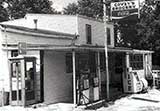 |
 |
 |
| Covey's Grocery at Four Corners | Four Corners From a Facebook post by Donald Lee Skirvin |
|
Couple from Four Corners elope, 1885.
Shupe's Grocery, 1978
Keefer Road and US 25
From a Facebook post by Carolyn Switzer
St. Joseph Catholic Church at Blanchett
Moved to Lawrenceville in 1948. While owned by Lawrenceville Baptist, it's no longer in use.
Rev. Paul Ryan's History of St. Joseph's at Blanchet is here.
Blanchett Bridge
From a Facebook post by Donald Lee Skirvin
On the Southern at Blanchett, March 25, 1912
l-r: R. H. Case, Flagman; Wm. M. Lanford, Conductor; 2 unknown employees of the Pullman Co.
| Blanchet Train Wreck, 1895. | Blanchett Train Wreck, 1904 |
| We've seen it spelled Blanchet. Blanchett, and Blanchette. For the record, we have no idea which is correct. The post office, back when it existed, was Blanchett. Current web searches only find Blanchet. | |
Blanchette elopement goes bad.
![]()
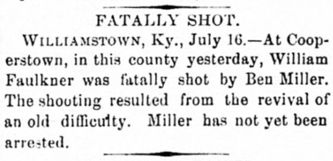
Alexandria, Virginia's Gazette, July 16, 1884
We have no idea where Cooperstown was.

Dromard?

Mt. Vernon (KY) Signal, March 9, 1917
| Hazel Ogden's History of Stringtown is here (pdf). | Postmaster at Clark's Creek asks for supplies. |
| History of the Elizabeth Christian Church in Stringtown, here. (pdf) | Keefer was once known as Priceburg, after its first store owner, John Price. |
|
|
|
| A writer asks the Williamstown Courier, “Where's Delia?” The answer is here. | Bethel Grove Methodist Church dedicated in 1883. |
| “On the fifth Sunday in October, the new White’s Chapel Methodist church on Eagle Creek will be dedicated. Dinner on the ground. Those near enough are asked to bring well filled baskets.” from the Williamstown Courier, October 13, 1904 | |
| History of the Salem Methodist Church is here. | The dedication of the new Salem Church (left) was commemorated with poetry. Read it here. |
![]()

Daily Evening Bulletin (San Francisco), July 9, 1888
| Downingsville becomes an official city in 1844. | |
| A chemical analysis of the mineral springs at “Dowlingsville” in Grant County, from 1856, is here. | Heavy losses from 1926 fire in Downingsville, story here. |
| “Williamstown, July 29. - A sad shooting affray took place at Downingsville, this county, last Tuesday, between William Cates, jun., and John R. Clifton, a worthless vagabond. Shots were exchanged from both parties for a few seconds. All but one of Cates' pistol balls entered the inner man of Clifton, causing death.” Cincinnati Enquirer, July 30, 1880 | |
| “A difficult took place at Downingsville, Grant county, Ky., Saturday, between two some what noted characters, named Jim McCune and Jim Powell, alias ”Indian Jim.“ which resulted in the latter being shot and mortally wounded. McCune was arrested and lodged in the county jail at Williamstown. An old feud had existed between the parties.” The Louisville Daily Journal, December 21, 1867 | |
| Yet another Downingsville murder. | Two Shootings. One Downingsville. |
![]()
Eagle Creek used to flow north at Folsom into the Ohio? Yes. More here.
![]()
Elliston Post Office
From a Facebook post by Donald Skirvin
| “The Elliston Post Office had two doors and a porch on the front side, and no door on the side (where you see the door now). That property was owned by my great Aunt Edith when the post office closed in 1976, and until her death in 1994. The post office building had originally been the summer kitchen for her house, and had been turned and moved down the hill to serve as the post office. It sat where you can see the small outbuilding (smokehouse) in this photo.” From a Facebook post by Jimmy Jackson |
L&N in Elliston, 1929
| “Dr. Farrell of Elliston, Ky., has the reputation of being a
wife beater. He went home drunk and
whipped his
wife. Monday night a mob was organized and he was hanged
to the limb of a tree.
He was discovered by boys and
cut down before his life was extinct. He will recover.”
from the New York Times, May 7, 1896.
The Times article above is obviously picked up from this item, which ran in a number of Kentucky and national papers. Well, except, not so much. The story of what really happened is here. (A much better story!) But ultimately, Dr. Farrell did have an unhappy ending. |
||
| Hooliganism in 1876 Elliston, here and here. | Robbery in Elliston. | Experts say there's a giant oil field between Bracht and Crittenden. |
| Road authorized from Elliston to Collin's Mill, 1876. | ||
| Bloody shooting in 1895 in Elliston, here. | 1874 train wreck in Elliston, here. | Elliston depopulated for Webster trial, here. |
| An Interstate Commerce Commission report on a train wreck in Elliston in April of 1938 that killed one and injured 5, and is here. The news report is here. | ||
| Railroaders riot in Elliston, 1896. More details. | ||
| Violet Price remembers Elliston, here. | Elliston petitions to be move to Gallatin County, here. | Gypsies visit Elliston in 1918, here. (pdf) |
| “The colored brethren and sisters of this vicinity dedicated their new Baptist church at this place [Elliston] last Sunday, having a large and orderly crowd with very interesting services.” The Williamstown Courier, August 1, 1895 | ||
![]()
| Elliston Station On one bright Sabbath morning Not a sound to break the still, As I sat beneath my awning And watched the gamblers ascend the hill. Then a thought came to my mind What would be their destination, If they gambled away their time, On the hill at Elliston Station. Then I watched them on their onward course Till they reached the mountain height Then I saw the gambling force Pass slowly out of sight; Then a thought ran through my brain, Of wife, and then starvation, If they keep up the gambling shame On the hill at Elliston Station. Then I turned my head around Not a soul that I could see, It seemed as though the town Was as dull as dull cold be; Then I thought about God’s word In the book of revelation Then to see the gambling herd On the hill at Elliston Station. There I saw in a world of wonder, Of heaven, earth, and hell, Then to see the little hill yonder, Where the gamblers always dwell; Is it not a Sabbath shame Upon this plantation For to see the gambling herd On the hill at Elliston station? I may break the Sabbath part In a different part of sin, But I’ll never break my Mother’s heart, In a gambling game to win; I may disobey god’s will, Then God of my salvation, But I will never visit the gambling hill That lay north of Elliston station. [signed] Your Friend. from the Williamstown Courier, October 21, 1897 |
![]()
The Needham Block, occupied by Owen Hulett, W. P. Stratton and
others
The store was previously owned by Musselman (the name on the
building)
but is now (1901) under the ownership of Owen Hulett. Where is it?
They didn't say.
![]()
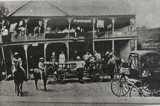 |
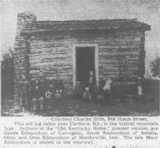 |
|
| Cordova General Store From a Facebook post by Grant County Historical Society |
Cordova Log Cabin Cincinnati Times Star, May 15, 1950 |
Mt. Pleasant School, near Cordova
From a Facebook post by the Grant County Historical Society
| Near Cordova, where Grant, Pendleton and Harrison come together is an area known as Crooked Creek. A site dedicated to the families there is here. | |
| Cordova General Store burns in 1928. | 1877 Description of Cordova, here. |
| Cordova is likely named for the Córdova Rebellion in Texas in 1838. Wikipedia has details. | |
| “Crooked Creek is a beautiful silver stream that runs between two lofty hills. It rises near Corinth, and flows north-east and empties into the Licking river. Two very beautiful little towns are situated on it: Cordova, five miles from the head; and Callensville, at the mouth; also, one Methodist church, known as Layton’s Chapel.” From the Williamstown Courier, December 15, 1898 | |
![]()
| “Bradley & Pettit, Folsom, Kentucky, are closing out their entire stock of goods for the purpose of quitting business, and in order to make a quick job of it are offering their entire stock of general merchandise at cost or under cost. The stock comprises one of the best assortments of up-to-date general merchandise to be found anywhere, consisting of dry goods, notions, men's and boys' clothing, hats and caps, furniture, hardware, queensware, groceries, wagons, etc. Also, good saw mill, all complete, in first class running order, for sale very cheap. Bradley & Pettit, Folsom, Kentucky.” from the Warsaw Independent, May 6, 1905. |
![]()
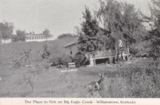 |
 |
|
| The Place to Fish on Eagle Creek | Wiedemann's Camp |
![]()
| “C. W. Renaker, the cashier of the Peoples Deposit Bank [of Glencoe] and A. L. Ward, the clever postmaster, while trying to cross Brush Creek Sunday night after the hard rain, got in very deep water, and the horse became frightened and turned the buggy over and broke two wheels to pieces. Fortunately, neither of the men were hurt. They had been to the sanctified meeting near Folsom. It is a question whether they lost their sanctification or not during the accident.” from the Warsaw Independent, September 15, 1906 |
![]()
Remember Elliotsville? There's a description here.
Remember Kennedy's Mills? There's a description here.
![]()
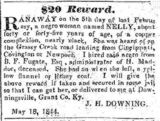
Licking Valley Register, August 10, 1844
An enslaved Nellie runs away from Downingsville
O'Possum Ridge School. Details.
Harrison's Homestead, Heekin
This home has a remarkable history.
![]()
| “A new post office has been established in Grant county at the store of Charley Alexander, on the Warsaw Road, near the old Blackburn residence. The new post office has been christened “Hanks” – we presume after the Hon. Richard Hanks, the grocer, of Cincinnati. The new office will receive mail three times a week.” From the Williamstown Courier, December22, 1898 |
| “The Ezra post office has been discontinued.” from the Williamstown Courier , April 13, 1905 |
![]()
